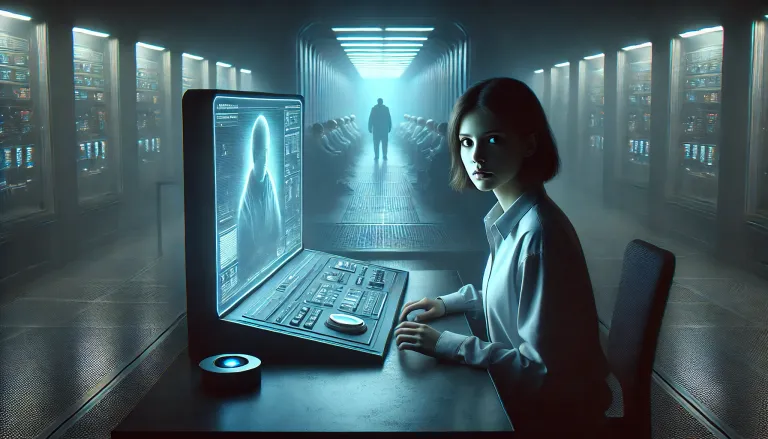"She slid the card across the counter, her face unreadable."
“Access to file 28B-K?” The clerk’s tone was cautious, like someone feeling around in the dark for a sharp edge.
“Yes,” Lia said firmly. “I believe I have the right.”
The clerk hesitated, his gaze flickering to the holographic badge on her chest. It glowed faintly—a mark of limited clearance. Limited, but not none. He exhaled through his nose, keyed in her request, and watched as the system churned.
“Alright, Ms. Kintor,” he said. “You’ll have twenty minutes. Whatever you see—well, you know the rules.”
“I do.”
He leaned closer. “Then you know it’s your funeral if you dig too deep.”
Lia’s lips tightened, but she said nothing. She slipped the badge back into her pocket and followed the pulsing blue line on the floor to Room 17.
The government’s Keyhole Directive was a marvel of transparency—or so they claimed. Citizens could submit formal requests for classified information, from old criminal cases to secretive scientific projects. For a fee and a lot of bureaucratic patience, access was granted. But there was always a catch: the viewer bore full responsibility for what they uncovered.
No exceptions.
Lia sat in the sterile, dim-lit room, the Keyhole terminal glowing faintly in front of her. Her pulse thumped in her ears as she pressed her palm to the scanner.
“Confirming user identity,” the machine chirped. A moment later, it spoke again, almost cheerfully: “File 28B-K is now available for viewing. Please proceed.”
The screen flickered to life, and Lia stared at the familiar image that materialized—a photo of her father, grim-faced and younger than she remembered.
Beneath it, the words glared back at her: “Subject: Declan Kintor. Status: Deceased. Classification: 4.3A.”
She swallowed hard. She already knew he was dead; he’d disappeared ten years ago, leaving only the vaguest about some “classified operation.” But the official word had always been vague: missing during service.
Now, with trembling fingers, she navigated deeper into the file.
image generated by DALL-E
Her father wasn’t missing. He was killed.
The first few pages were dry, bureaucratic summaries: his deployment, his assignment to the mysterious Project Glaive. It didn’t mean much until she reached the autopsy report.
“Cause of death: fatal blunt trauma to the cranium.”
The air in the room thickened, and her breath caught. The report continued:
“Incident occurred on-site, involving physical confrontation with civilian personnel. Details omitted under Directive Clause 72F.”
What?
She clicked furiously, diving into the restricted sections, bypassing warnings with clearance overrides she wasn’t supposed to know. She didn’t care anymore.
The footage was grainy but unmistakable: her father standing in a desolate factory, arguing with a man in a lab coat. The sound was muted, but Lia could read his lips.
“This isn’t what we agreed to,” he was saying. “You’re crossing a line.”
The scientist’s response was sharper, more animated. Words like “necessary” and “greater good” jumped out.
Then came the blur of motion—the scientist lunging, her father striking back, the two of them wrestling until…
Until her father fell.
Lia’s chair creaked as she leaned back, her breath shallow. There it was. Proof. Declan Kintor hadn’t died a hero in the line of duty. He’d been murdered.
And it had been buried.
Lia knew the rules. Accessing this file meant she couldn’t take what she’d learned outside this room. But rules had never stopped her before.
She pulled out a tiny device, no bigger than a pen cap, and pressed it to the terminal. A soft beep confirmed the data transfer.
By the time she exited the facility, the cool night air did little to calm her nerves. Her fingers twitched around the badge in her pocket, her mind racing.
“Was it worth it?” a voice interrupted her thoughts.
She spun, finding the clerk standing by the entrance, arms crossed. His expression was unreadable.
“What?” she asked, feigning confusion.
“Whatever you took,” he said flatly. “Was it worth the price you’re about to pay?”
She stared at him, her jaw tightening. “I don’t know what you’re talking about.”
The clerk shook his head. “Sure you don’t. But you’ll find out soon enough.”
Lia didn’t make it far before the warning buzzed on her comm device: “Unauthorized data extraction detected. Please return for debriefing immediately.”
Her heart sank, but she kept walking.
She didn’t have a plan yet, but she knew one thing: the truth wasn’t meant to stay buried. And if the Keyhole Directive had made one mistake, it was assuming people like her wouldn’t dig deep enough to find the bodies they’d hidden.
Inspired by Worldbuilding Prompt #901 - Public/Private Information by @worldbuilder
Posted Using InLeo Alpha